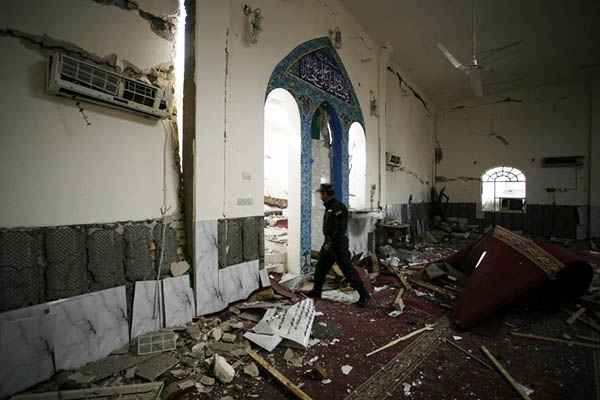
Haidar Hamdani—AFP
Police say men in military uniforms targeted the Sunni mosques and left one person dead.
Blasts rocked two Sunni mosques in central Iraq Monday, amid fears of renewed sectarian strife following Saudi Arabia’s execution of a prominent Shia cleric, police and medics said.
As thousands demonstrated against the Gulf monarchy in Baghdad, Prime Minister Haider al-Abadi vowed to track down the attackers, whom he said were attempting to undermine national unity. After Saudi Arabia severed ties with Iran over the firebombing of its embassy and was followed by Bahrain and Sudan, the protesters demanded Baghdad break off relations with Riyadh.
A man was killed in one of the overnight attacks and a muezzin, who recites the Muslim call to prayer, was gunned down in the same region south of Baghdad.
In Hilla, about 80 kilometers from the capital, a police captain said the Ammar bin Yasser mosque in Bakerli neighborhood was bombed after midnight.
“After we heard the explosion, we went to its source and found that IEDs had been planted in the mosque,” he said. “Residents said a group of people with military uniforms carried out this operation,” he added.
A witness said he saw gunmen shoot dead a young man displaced from his hometown of Ramadi who had been living in the mosque with his family.
“The armed men killed one of the displaced who lives in the mosque” with his wife and two children, the resident said on condition of anonymity for fear of reprisals. A Hilla doctor confirmed the death.
Ramadi is a Sunni city where Iraqi federal forces reclaimed the upper hand a week ago after months of battling the Islamic State group.
The Al-Fateh mosque in a village called Sinjar, just outside Hilla, was also destroyed overnight. A police captain said three or four men in military uniforms were involved in that bombing. “They took advantage of the cold weather, there was nobody outside,” he said.
A medical source in Hilla said three people were wounded in the explosions.
There was no immediate claim of responsibility for the blasts, nor for the killing near the town of Iskandariyah, about 40 kilometers south of Baghdad.
A local councilor identified the slain muezzin of the Mohammed Abdallah Jabbouri mosque in Haswa as Taha al-Juburi. “He was ambushed by unknown gunmen near his house,” a source in Iskandariyah police said. A doctor also confirmed his death.
Iskandariyah is part of a mixed Sunni-Shia area south of Baghdad, which was once dubbed “the triangle of death” and was badly affected by sectarian violence last decade.
Pushing back I.S. in this region after the jihadists took over large parts of the country in 2014 was one of the priorities of the government and allied Shia militias. That was achieved in a few months and I.S. has been largely eradicated from the area but violence—of a sectarian nature and crime-driven—has remained frequent.
The weekend execution in Saudi Arabia of prominent Shia cleric Nimr al-Nimr sparked outrage in Iraq. Shia politicians and clerics unanimously condemned the execution but several religious figures in the Sunni minority also denounced it.
“We ordered Babil operations command to hunt down the criminal gangs of Daesh and their likes who targeted mosques to sow sedition and undermine national unity,” Abadi said on Twitter.
Thousands of supporters of prominent Iraqi Shia cleric Moqtada Sadr demonstrated near the foreign ministry on Monday, demanding all ties with Saudi Arabia be broken off. The protesters threatened to storm the so-called “Green Zone” where the newly reopened Saudi embassy is located but they were held back by organizers and riot police.
Iran has accused Saudi Arabia of using Nimr’s execution to stoke sectarian tensions in the region. Tehran has warned the Gulf monarchy it would pay a “high price” for the execution, which was one of 47 carried out on Saturday.
The Saudi embassy in Tehran was firebombed by an angry mob, prompting Riyadh to respond by announcing it was breaking off diplomatic relations with Iran.
